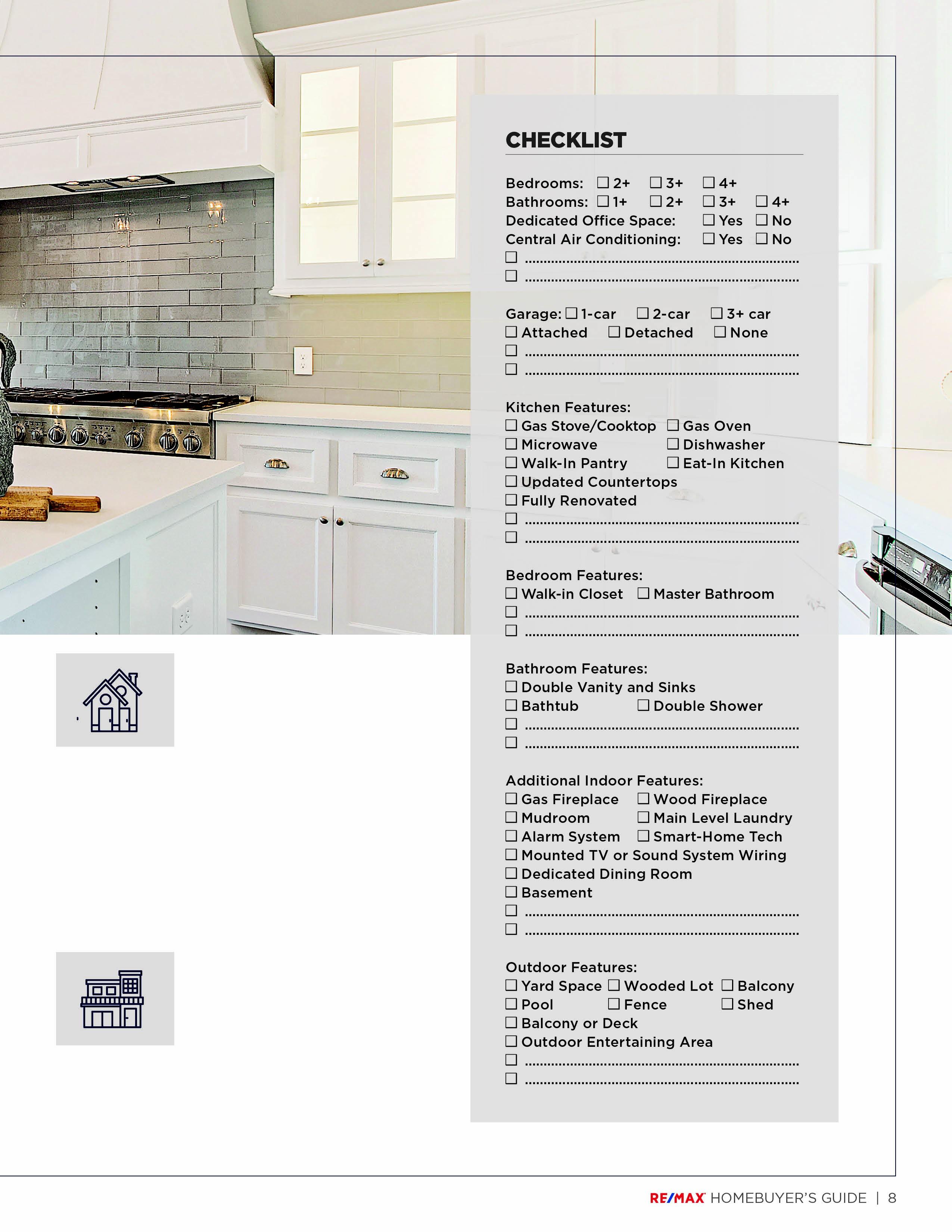HOMEBUYER’S GUIDE

A resource to help guide you through the homebuying experience from start to finish.




A resource to help guide you through the homebuying experience from start to finish.



Buying a home is often your largest financial commitment, but it’s also one of the smartest investments you can undertake. Beyond the pride of homeownership, you’ll gain benefits like potential tax deductions and long-term value. Whether you’re ready to buy or planning ahead, let this be your first step. This guide simplifies the home buying journey, giving you key terms, factors to consider when selecting a home, and a checklist to help save you time during your search.
With over 50 years of excellence, RE/MAX has cultivated a global network of top-performing, full-time real estate professionals. As a RE/MAX agent, I bring unmatched experience, averaging more sales than others in the industry. You’ll work with a dedicated expert who has current market knowledge and a powerful support network to guide you in finding and securing your dream home.

1. Interview agents.
2. Explore mortgage options, get pre-approved.
3. Browse homes online.
4. Identify homes you like and schedule home tours.
5. Make an offer.
6. Get a home inspection.
7. Close the deal.
8. Update utilities and transfer services.
9. Move into your new home!
Whether you’re a first time buyer or a seasoned investor, you can trust me to provide thorough service and tailored guidance.



You’re going to have questions during this process. That’s why it’s important you choose an agent who has your best interests in mind and will help you navigate the process with effective and timely communication. Call me anytime. I can explain confusing paperwork and of course, assist you in all areas of your home search.



Being pre-approved strengthens your offer to purchase. Here are a few things you should be ready for when meeting with a mortgage lender:
1. Lenders will examine your credit history to help decide if you’re a good candidate for a loan.
2. Lenders ask for a list of your past employers, how long you’ve been with your current employer and what your annual salary is. They want to make sure you can make regular mortgage payments.
3. Lenders ask for past tax records, recent
bank statements and current debt, including credit card debt, car loan or student loan. They want to know your debt-to-income ratio to know if you can make each loan payment with the income you earn.
4. Mortgage loan and lender options vary. Different loan types can accommodate different financial situations. The same goes for additional resources like the Federal Housing Administration (FHA) or Freddie Mac. I can help you understand the various options and help you pick the right one for your situation.

As a homebuyer, you can expect to see a variety of different home styles and designs. You’ve got options. What’s most important is that you choose a home that complements your lifestyle and your income. To narrow down your choices:
• Know your budget and stick to it.
• Determine a desired location.
• Consider how many bedrooms, bathrooms and square feet you need.
• Decide which amenities are must-haves versus like-to-haves.
• Consider your needs for outdoor space, like a yard or balcony.
Once you’ve identified your must-haves, you can ask me to send you listings that meet your criteria via email or text message. I can coordinate showings for properties you’d like to see in person.
There are lots of ways you can get a feel for a property by simply utilizing the tools that are available online. If something catches your eye, let me know as the MLS often has information on properties that may not be included in the description or on third party websites.

Make sure you look at all the photos and spend some time noting the layout of rooms. Consider how your own furniture will look in the space. If the property is staged, consider where different furniture pieces are placed and how you could rearrange the space to work for your style and needs.
If you’re looking at a property online that may need some upgrades, take note of those. See which elements of the home work for you already and which areas you would consider renovating in the future.
One thing that many people forget to consider when viewing a home online is the outdoor space. Whether it is a small balcony or a large backyard, outdoor space is definitely something to try to get a feel for when viewing a home virtually. Consider any maintenance that may be required, as well as how it may be affected by different seasons. Ex. Will you need to trim and maintain trees?

Also known as a Cape Cod, this style has a deep pitched roof and clean, simple design. Dormers can be added to a pitched roof to add windows or usable space on the upper level.
Also called a split entry, this home style typically has two short sets of stairs running up and down from the point of entry. It may or may not have living space at entry level.
Also referred to as a bungalow, a single-level house is known for a long, low design with all or most living space on ground level. Some have a basement level which may be finished into additional living space. A lower level walk-out includes a door to the exterior.
A two-story home has two full levels of living space. A traditional two story will have a ground level with an often equally sized floor directly above. Often you will find living space on the ground level, with the main suite and additional bedrooms on the second floor. There may also be a basement level. A Colonial is a type of two-story home with equal windows on the front upper and lower level.
An owned unit in a large property complex that consists of many individual units. Often has a fee that covers shared monthly expenses for the upkeep of the building and facilities.
An owned unit in a row of houses all attached to one another. Often has an association fee that covers shared monthly expenses for the upkeep of the exterior and any shared facilities.

Twin Home
Also called a semi-detached, this home has two single-family dwellings that are separated by one common wall and have mirror image layouts. Twin homes typically have two separate street addresses and can be owned by two different homeowners. Since outdoor maintenance is the responsibility of the homeowners, it is important to consider shared expenses that may exist, such as upkeep of common spaces like the yard or shared driveway.
A duplex is a home consisting of two separate dwellings that are either side by side or stacked on top of each other. They typically have identical layouts or a mirror image of each other. A duplex typically has one street address with unit numbers and one property owner.
Purchase insurance. You are required to purchase homeowners insurance if you have a mortgage. Make sure you purchase enough to fully cover your home and your belongings in case of a total loss.
Get a home inspection. Home inspections typically cost a few hundred dollars and aim to uncover any significant issues with the property. You can make your purchase agreement contingent on the inspection results, allowing you to withdraw your offer without penalty if any issues are identified.
Determine the status of utilities. In a traditional home sale, with sellers as occupants, you’ll want to check on the status of the utilities required by the home. Outstanding invoices for items such as water, gas and electric should be paid in full by the owners before closing. You will also want to have the services transferred to your name for billing. In a foreclosure or vacant home sale, in which the water has been turned off, contact the city to turn the water back on and check for broken or damaged pipes. You can ask me for help with this.
When you’re ready to make an offer, I can prepare the required paperwork and we can negotiate the purchase price and terms on your behalf.
Don’t hesitate to ask for a referral if you’re looking for a:
• Mortgage Lender
• Inspector/Appraiser
• Moving/Cleaning Company
• Insurance Provider
• Contractor
• Landscaper

You will have a number of new tax considerations, including new deductibles such as mortgage insurance and property tax to claim. If you’re not sure what you’ll be eligible to claim, consider visiting a tax consultant or visit IRS.gov.

By familiarizing yourself with these homebuying terms, you’ll be better equipped to make informed decisions and a wise investment.
Amortization. The length of time allotted to paying off a loan – in homebuying terms, the mortgage. Most maximum amortization periods in the U.S. are 30 years, but options vary. Consult your mortgage lender to determine what is right for you.
Balanced market. In a balanced market, there is an equal balance of buyers and sellers in the market, which means reasonable offers are often accepted by sellers, and homes sell within a reasonable amount of time and prices remain stable.
Bridge financing. A short-term loan designed to “bridge” the gap for homebuyers who have purchased their new home before selling their existing home. This type of financing is common in a seller’s market or when life events happen and affect timing, allowing homebuyers to purchase without having to sell first.
Buyer’s market. In a buyer’s market, there are more homes on the market than there are buyers, giving the limited number of buyers more choice and greater negotiating power. Homes may stay on the market longer, and prices can be stable or dropping.
Closing. This is the last step of the real estate transaction, once all the offer conditions outlined in the Agreement of Purchase and Sale have been met and ownership of the property is transferred to the buyer. Once the closing period has passed, the keys are exchanged on the closing date outlined in the offer.
Closing costs. The costs associated with closing the purchase deal. These costs can include legal and administrative fees related to the home
purchase. Closing costs are additional to the purchase price of the home.
Comparative market analysis. A comparative market analysis (CMA) is a report on comparable homes in the area that is used to derive an accurate value for the home in question.
Home inspection. The home inspection is performed to identify any existing or potential underlying problems in a home. This not only protects the buyer from risk, but also gives the buyer leverage when negotiating a purchase price.
Condominium ownership. A form of ownership whereby you own your unit and have an interest in common elements such as the lobby, elevators, halls, parking garage and building exterior. The condominium association is responsible for maintenance of building and common elements, and collects a monthly condo fee from each owner based on their proportionate share of the building.
Contingencies. This term refers to conditions that have to be met in order for the purchase of a home to be finalized. For example, there may be contingencies that the mortgage loan must be approved or the appraised value must be near the final sale price.

Deposit. An up-front payment made by the buyer to the seller at the time the offer is accepted. The deposit shows the seller that the buyer is serious about the purchase. This amount will be held in trust by the agent or lawyer until the deal closes, at which point it is applied to the purchase price.
Down payment. The down payment is the amount of money paid-up front for a home, in order to secure a mortgage. In the US, down payments typically range from 3.5% to 20% of the home’s total purchase price. Down payments less than 20% of a home’s purchase price may require mortgage loan insurance. The selling price, minus the deposit and down payment, is the amount of the mortgage loan.
Equity. The difference between a home’s market value and the amount owed on the mortgage. This is the portion of the home that has been paid for and is officially “owned.”
Fixed-rate mortgage. A fixed-rate mortgage guarantees your interest rate for a predetermined amount of time.
Home appraisal. A qualified professional provides a market value assessment of a home based on several factors such as property size, location, age of the home, etc. This is used to satisfy mortgage requirements, giving mortgage financing companies confirmation of the mortgaged property’s value.
First-time homebuyer assistance. Various programs exist across the US to help first-time homebuyers. Consult your mortgage lender for options you might want to consider or options for which you might qualify.
Land survey. A land survey will identify property lines. Simply put, it helps define what is yours and
what isn’t. It is not required to purchase a house, but it is recommended and may be required by the mortgage lender. A land survey is important if issues arise between neighbors or the municipality, should the owner wish to make changes in the future involving property lines.
Seller’s market. In a seller’s market, there are more buyers than there are homes for sale. With fewer homes on the market and more buyers, homes sell quickly in a seller’s market. Prices of homes are likely to increase, and there are more likely to be multiple offers on a home. Multiple offers give the seller negotiating power, and conditional offers may be rejected.
Mortgage pre-approval. A mortgage pre-approval helps buyers understand how much they can borrow before going through the mortgage application process. Allows you to make an immediate offer when you find a home, since you know how much you’ll be approved for this lender, and locks in the current interest rate for a period of time, insulating you against near-term rate increases.
Title insurance. Title insurance is a policy designed to protect both yourself and your mortgage lender from financial loss or damages caused by potential title defects such as code violations or legal complications. Requirement of title insurance varies, so check for more information regarding your specific situation.
4 Point / Wind Mitigation Reports. Insurance companies require these reports. 4-Point Inspection is a detailed examination of a home’s 4 systems: roof, electrical, plumbing, and HVAC. A Wind Mitigation Report provides details about how the roof is built, and how it is attached to the home. They also do a visual examination to see how well it can withstand strong winds and water damage.
Bundled Golf. Community that has a private golf course included in the fees for ownership.
CDC, Community Development District. Developers can fund building infrastructure like roads, canals, landscape features through issuing bonds. These bonds are paid via real estate taxes. Unaware buyers getting their first real estate tax bill will be surprised at paying more than was disclosed. Important to know whether a community has a CDC or not.
Coastal Construction Setback Lines. Lines established and periodically reviewed as for building restrictions along coastline.
Condominium Association. Under Florida law, once a condominium purchase contract is signed, the condominium association must provide the buyer with the FAQ and Answers Sheet, along with other required documents, in accordance with local and national regulations.
Contract Addendum. An attachment to a contract that modifies the terms of the original contract. For example, changing the closing date or adding a new inspection requirement. Once signed by all parties, an addendum becomes legally binding and part of the original contract.
Equity. The difference between a home’s market value and the amount owed on the mortgage. This is the portion of the home that has been paid for and is officially “owned.”
FIRPTA, Foreign Investment in Real Property Tax Act of 1980. Income tax withholding from transactions to assure taxes are paid. Properties bought and sold for no more than $300,000 do not require FIRPTA withholding.
HOA, Homeowners Association. Legal entity created and structured for owners to govern community. They establish homeowner fees, hire managers, establish budgets, create rules & restrictions, and are otherwise guided by laws of Florida.
HUD Statement - Closing Statement. Statement for Buyers and Sellers calculating the bottom line for each party.
Milestone Inspection. A structural inspection generally required for condominium associations and cooperative buildings 3 stories or higher which have been occupied 30 years or more, or if located within three miles of Florida’s coastline, occupied 25 years or more.
Structural Integrity reserve study. A study of reserve funds required for future major repairs and replacement of the common areas which must be conducted for condo and cooperative association buildings that are three stories or higher.


RE/MAX REALTY GROUP
Alex von Zittwitz
Resale Specialist (239) 672-0125 (office) avonzittwitz@remax.net https://avonzittwitz.remax.com https://realtybizcard.com/floridaliving

